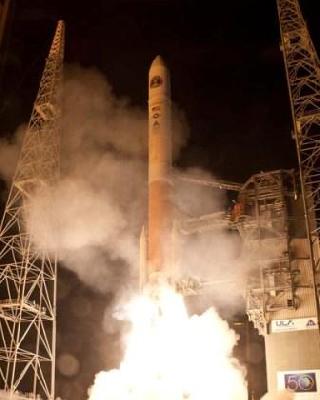
PALO ALTO, CALIFORNIA (BNS): Scientists have for the first time reported observations of the final death throes of a comet as it passed across the face of the Sun to vanish in flight.
Scientists at the Lockheed Martin Solar and Astrophysics Laboratory (LMSAL) at the Advanced Technology Center (ATC) and collaborators at other institutions made the observations using the Atmospheric Imaging Assembly (AIA) instrument on board NASA's Solar Dynamics Observatory (SDO).
The comet was first seen as it passed across the face of the Sun on July 6, 2011, about 0.2 solar radii off the limb of the Sun, travelling at nearly 400 miles per second and was tracked for 20 minutes until it disintegrated and evaporated in the low solar corona, about 62,000 miles above the solar surface.
The Extreme-Ultraviolet Imager (EUVI), on one of NASA's twin Solar-Terrestrial Relations Observatories (STEREO), made simultaneous additional observations of the comet's passage from its near-quadrature view relative to the Sun-Earth line.
According to the paper published in journal Science, the comet was discovered on July 4, 2011 by using the Large Angle and Spectrometric Coronagraph (LASCO) on the ESA/NASA Solar and Heliospheric Observatory (SOHO), and was designated comet C/2011 N3 (SOHO).
The SOHO discovery alerted Lockheed Martin scientists to watch the AIA data stream for the comet's likely transit across the face of the Sun.
Dr. Karel Schrijver, lead author of the Science paper and AIA principal investigator said, "As we witnessed this comet evaporate as it traversed a known amount of space over a specific period of time, we were able to work backward to estimate its mass just before it reached the Sun.
We've been able to bracket its size as between 150 and 300 feet long, with a greater likelihood that it lies at the upper end of that range. And it most likely weighed in at as much as 70,000 tons, giving it about the weight of an aircraft carrier, when it first became visible to AIA."
As the comet streaked into the solar atmosphere it had already fractured into many large pieces ranging in size from 30 to 150 feet. The pieces were embedded in the nebulous envelope made up of ice, dust, and gas called the coma, surrounding the comet's nucleus. The coma was estimated to be about 800 miles across, followed by a glowing tail approximately 10,000 miles long.
The tail was seen pulsing from dim to bright to dim again during the journey across the Sun, which suggests that there was further breakup of the individual chunks of comet as it continued to fragment in the intense glow from the Sun's surface. Eventually, the comet evaporated completely.
"I think the light pulses in the tail were one of the most interesting things we witnessed," said Schrijver.
"The comet's tail gets brighter by as much as four times every minute or two. The comet seems first to put a lot of material into that tail, then less, and then the pattern repeats. Only because of these pulses can we measure how fast the tail falls behind the comet as its gases collide with those in the Sun's atmosphere. And that, in turn, helps us measure the comet's weight.
The Solar and Astrophysics Laboratory at the ATC conducts basic research into understanding and predicting space weather and the behavior of our Sun, including its impacts on Earth and climate. The ATC is the research and development organization of Lockheed Martin Space Systems Company (LMSSC).
 Previous Article
Previous Article Next Article
Next Article












The Indian Air Force, in its flight trials evaluation report submitted before the Defence Ministry l..
view articleAn insight into the Medium Multi-Role Combat Aircraft competition...
view articleSky enthusiasts can now spot the International Space Station (ISS) commanded by Indian-American astr..
view article